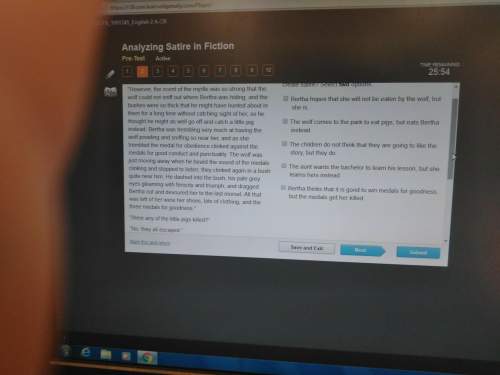Excerpt adapted from A Tale of Two Cities
by Charles Dickens
A beautiful landscape, with...

English, 19.05.2020 19:58 kaliyaht01
Excerpt adapted from A Tale of Two Cities
by Charles Dickens
A beautiful landscape, with the corn bright in it, but not abundant. Patches of poor rye where corn should have been, patches of poor peas and beans, patches of most coarse vegetable substitutes for wheat.
Monsieur the Marquis in his traveling carriage (which might have been lighter), conducted by four horses and two guards on horseback, labored up a steep hill. A blush on the countenance of Monsieur the Marquis was no fault of his high breeding. It was not from within. It was brought on by an external circumstance beyond his control—the setting sun. In effect, the sun was so low that it dipped at that very moment.
But, there remained a broken country, bold and open, a little village at the bottom of the hill, a broad sweep and rise beyond it, a church-tower, a windmill, a forest for the chase, and a crag with a fortress on it.
The village had its one poor street, with its poor tannery, poor tavern, poor stable-yard for relays of post-horses, poor fountain, all usual poor appointments. It had its poor people too. All its people were poor, and many of them were sitting at their doors, shredding spare onions and the like for supper, while many were at the fountain, washing leaves, and grasses, and any such small products of the earth that could be eaten. Expressive signs of what made them poor were not wanting. The tax for the state, the tax for the church, the tax for the lord, tax local and tax general, were to be paid here and to be paid there, according to solemn inscription in the little village, until the wonder was, that there was any village left unswallowed.
Few children were to be seen. As to the men and women, their choice on earth was stated in the prospect—life on the lowest terms that could sustain it, most likely down in the little village at the mill or up in the fortress on the crag.
Heralded by a courier in advance, and by the cracking of his guards' whips, Monsieur the Marquis drew up in his traveling carriage at the posting-house gate. It was next to the fountain, and the peasants suspended their operations to look at him. He looked at them, and saw in them, without knowing it, the slow sure filing down of misery-worn face and figure.
What is the main idea of the passage?
A. People should become politically involved and revolt.
B. Livestock and crops are needed for the community.
C. The poor and hungry are being neglected.
D. Rural and urban lifestyles are different.

Answers: 2


Other questions on the subject: English

English, 21.06.2019 14:20, Kaitlyn2321
Adam posted in a thread about theoretical physics. in his post he refuted general relativity and cited a paper that was recently self-published by one person on her own personal website and had no references to other works in the field. which important question did adam not answer sufficiently when evaluating the cited paper?
Answers: 2

English, 21.06.2019 22:30, merrickrittany
How could an audio recording most likely convey the characters emotions during the scene
Answers: 1

You know the right answer?
Questions in other subjects:

Mathematics, 26.10.2020 22:00

History, 26.10.2020 22:00





Mathematics, 26.10.2020 22:00


Computers and Technology, 26.10.2020 22:00




